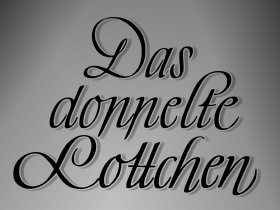Double Lottery (1950)
| Movie | |
|---|---|
| Original title | The double lottery |
| Country of production | Germany |
| original language | German |
| Publishing year | 1950 |
| length | 105 minutes |
| Age rating | FSK 0 |
| Rod | |
| Director | Josef von Báky |
| script | Erich Kaestner |
| production |
Carlton Film , Munich ( Günther Stapenhorst ) |
| music | Alois Melichar |
| camera | Walter Riml , Franz Weihmayr |
| cut | Fritz Stapenhorst |
| occupation | |
| |
The double Lottchen is the first film adaptation of the book of the same name by the German writer Erich Kästner from 1950, in which the author himself wrote the screenplay and took on the role of the narrator.
action
“The story we are talking about begins in the mountains. In Seebühl. Do you actually know Seebühl? The mountain village of Seebühl? “, With these words begins the story that the author himself, Erich Kästner , tells in person. This is the first page in the novel that has been taken almost word for word.
Two ten-year-old girls, the cheeky Luise Palfy from Vienna and the polite, modest Lotte Körner from Munich , meet in a holiday home for girls in Seebühl on the Bühlsee. They hate each other at first because they look so alike. After some research it turns out that the two are twins and were torn apart by their parents' divorce. Luise's father is a composer in Vienna, and Lotte's mother, who has taken back her old family name, works in Munich.
At the end of the vacation, the twins swap roles, which leads to some confusion among their unsuspecting parents because of their different abilities and character traits. When Lotte learns that her father wants to remarry, she becomes grief-stricken. By chance, the mother learns about the encounter between the sisters and finally about the illness. Mother and Luise go to Vienna, where the family reunites.
Production notes
The film was produced in the Bavaria Film studio in Geiselgasteig . The outdoor shots were taken in Thiersee . The premiere took place on November 27, 1950 in Vienna, in the Federal Republic then on December 22, 1950 in Bonn.
Reviews
“ The double Lottchen tells the story of incomplete families and the longing for harmony, for families with mother and father, which, against the background of the numerous single and single mothers, mostly war widows, gained their special significance in those post-war years. Precisely because the film does not openly address this background, but justifies the lack of family parents with a profane divorce, the film is still understandable for children today without any lengthy explanation. So both have something: The children see a well-made, exciting story, and the father next to them sees a film of his childhood, with the full ambiguity that is in this word. "
“Formally quite conventional, but sympathetic because of their self-confident sentimentality that never gets cheesy. The off-commentary spoken by Erich Kästner is subtle and underlines the fabulous depth of this utopia of a better childhood. "
Awards
- The state of North Rhine-Westphalia gave the film a high artistic rating.
- In 1951 the German Film Prize won prizes in the categories of best feature film , best director and for the screenplay .
- The film received the special award in 1951 from the Berliner Fachblatt Filmblätter for the most popular feature film in 1951.
- The film was at the XII. Shown at the Venice Film Festival .
literature
- Erich Kästner : The double lottery. A novel for children . With illustrations by Walter Trier . [Special edition for the film anniversary.] Dressler and Atrium-Verlag, Hamburg and Zurich 2000, 170 pages, ISBN 3-7915-3034-8
proof
- ↑ Dr. Alfred Bauer: German feature film Almanach. Volume 2: 1946-1955 , p. 100
- ↑ The double lottery. In: Lexicon of International Films . Film service , accessed August 27, 2017 .
Web links
- Twin girls in the Internet Movie Database (English)
- The double lottery at filmportal.de
